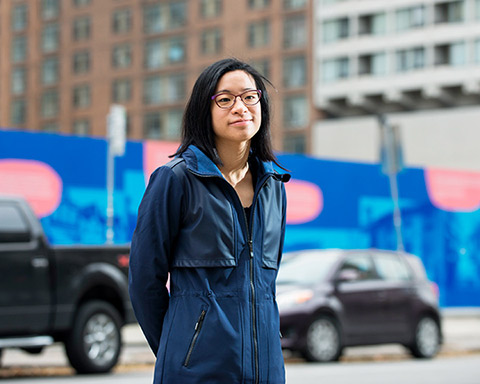Looking out over the huge, barren construction site for Toronto’s new courthouse on a late-October day, Ellen Tang (MSW 2017) describes the rich past of this tract of land northwest of City Hall. From the mid-19th to mid-20th century, it was home to St. John’s Ward, one of Toronto’s earliest immigrant settlements.
“During the excavation, they found artifacts from the Ward properties,” says Tang. Shoes, toys and dishes were among thousands of items that turned up, remnants from the neighbourhood that was originally home to refugees from the Irish Potato Famine, African-Americans who fled slavery, and Russian and Eastern European exiles. Images of artifacts and the stories and photos of former Ward residents appear along the construction fence – an exhibit curated by the Toronto Ward Museum, which Tang helped found. The museum, whose founding partners include U of T Scarborough, aims to revive the history of the Ward through exhibits (online and offline), events and more.
Every newcomer’s experience is unique – but hearing about those experiences can help immigrants feel less alone in their struggles, says Tang, whose family immigrated to Toronto from Hong Kong when she was 10, because of the uncertainty surrounding the colony’s handover from British to Chinese rule in 1997. “When we arrived here my dad didn’t come right away, so we were separated from him for a while. I felt very uprooted,” she says. “It was this strange feeling of simultaneously being in the spotlight – because I was the new kid and different – but also invisible – because the language barrier made it difficult to express myself, and no one really knew me. It wasn’t until I was older that I started to ask questions about identity, and become curious about my roots and how other immigrants navigated being part of two worlds.”
Tang is now a social worker at the Centre for Addiction and Mental Health’s New Beginnings Clinic for refugees experiencing mental health challenges. She says she feels a responsibility to use her education and privilege to improve other immigrants’ experiences. “I’m doing that directly in my job now, but I’m still always interested in how telling stories – like the Ward Museum does – can inform a bigger conversation about ways to make life better for newcomers.”
Recent Posts
People Worry That AI Will Replace Workers. But It Could Make Some More Productive
These scholars say artificial intelligence could help reduce income inequality
A Sentinel for Global Health
AI is promising a better – and faster – way to monitor the world for emerging medical threats
The Age of Deception
AI is generating a disinformation arms race. The window to stop it may be closing





